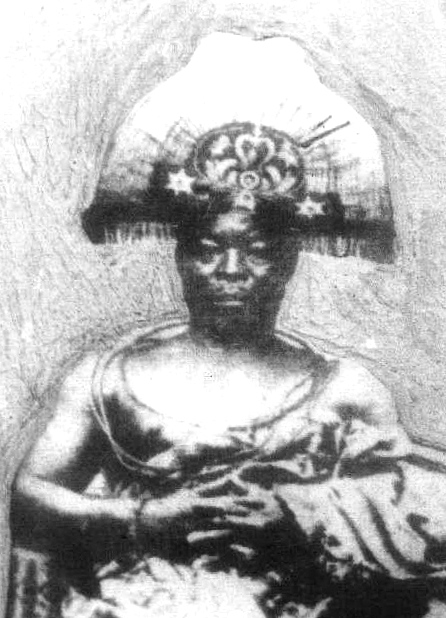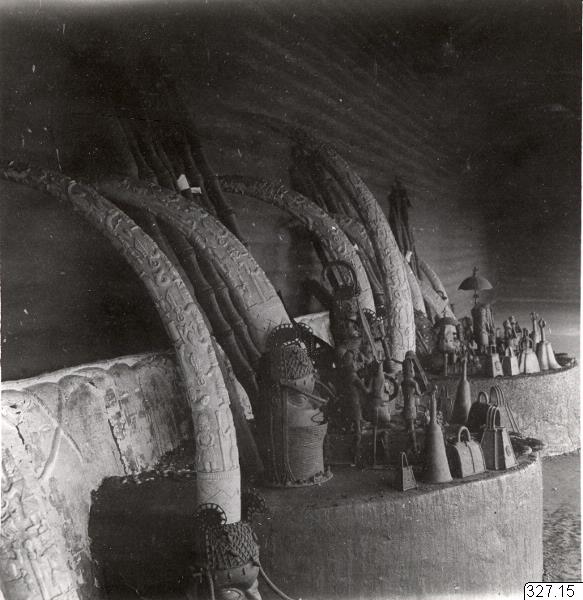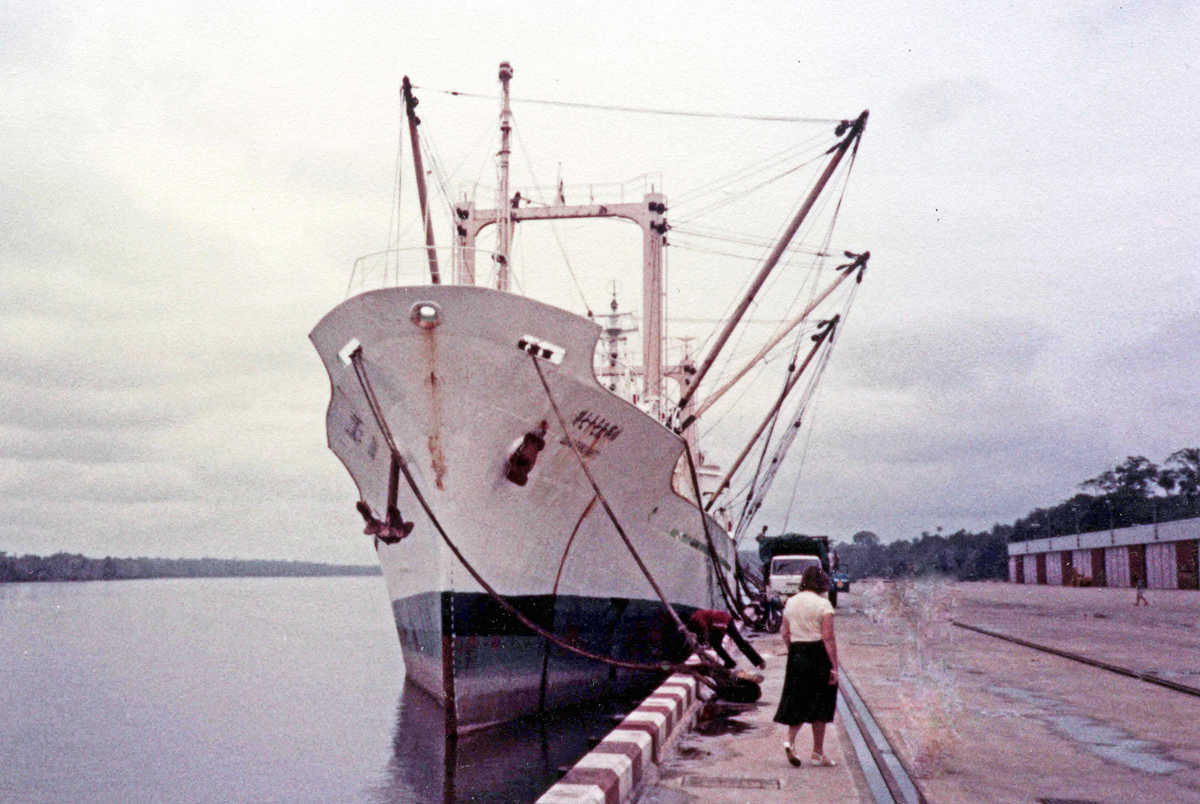|
Oba Of Benin
The Oba of Benin is the traditional ruler and the custodian of the culture of the Edo people and all Edoid people. The then Kingdom of Benin (not to be confused with the modern-day and unrelated Republic of Benin, which was then known as Dahomey) has been and continues to be mostly populated by the Edo (also known as Benin ethnic group). In 1897, a British military force, of approximately 1,200 men, under the command of Sir Harry Rawson, mounted the Benin punitive Expedition. The force dispatched in retaliation to the ambush of a British party, at Ugbine village near Gwato, on the 4th January 1897, by a group of Benin soldiers, acting without orders from the Oba; the ambush had led to the deaths of all but two of the British party. The British force captured the capital of the Kingdom of Benin, sacking and burning the city while forcing the Oba of Benin, Ovonramwen, into a six-month exile. The expeditionary force consisted of both indigenous soldiers and British officers b ... [...More Info...] [...Related Items...] OR: [Wikipedia] [Google] [Baidu] |
Oba Oguola - MCN 4179 (cropped)
Oba or OBA may refer to: * Oba (king), a Bini and Yoruba title for certain royal rulers * Oba (orisha), a spirit who is prominent in various Traditional African religions and Afro-American religions * Ōba, a Japanese surname * '' Oba: The Last Samurai'', a 2011 Japanese film * Oba Chandler (19462011), an American murderer executed in 2011 OBA * Office Business Applications, software which uses applications within the Microsoft Office system * Oklahoma Bible Academy, a Christian secondary institution in Enid, Oklahoma, U.S. * Oklahoma Bankers Association, a trade association in Oklahoma, U.S. * Oklahoma Bar Association, the state bar (legal association) of Oklahoma, U.S. * On base average, a baseball statistic * One Bermuda Alliance, a Bermuda political party * Only Boys Aloud, Welsh male voice choir * Openbare Bibliotheek Amsterdam, the public library of Amsterdam * Optical Brightening Agent, a type of dye used in fabric and paper * Out-of-band agreement, in communications * ... [...More Info...] [...Related Items...] OR: [Wikipedia] [Google] [Baidu] |
History Of Nigeria
The history of Nigeria can be traced to the earliest inhabitants whose remains date from at least 13,000 BC through early civilizations such as the Nok culture which began around 1500 BC. Numerous ancient African civilizations settled in the region that is known today as Nigeria, such as the Kingdom of Nri, the Benin Empire, and the Oyo Empire. Islam reached Nigeria through the Bornu Empire between (1068 AD) and Hausa States around (1385 AD) during the 11th century, while Christianity came to Nigeria in the 15th century through Augustinian and Capuchin monks from Portugal. The Songhai Empire also occupied part of the region. From the 15th century, European slave traders arrived in the region to purchase enslaved Africans as part of the Atlantic slave trade, which started in the region of modern-day Nigeria; the first Nigerian port used by European slave traders was Badagry, a coastal harbour. Local merchants provided them with slaves, escalating conflicts among the ethnic gr ... [...More Info...] [...Related Items...] OR: [Wikipedia] [Google] [Baidu] |
Ogiso
This is a list of the independent Ogisos (Kings) of Igodomigodo, which was to become the Benin Empire, from 40 BCE to 1100 CE. The dating is based on the recollection made by Daryl Peavy of the oral traditions of the Edo people. The Ogiso were assisted by seven nobles called the "Uzama". During the reign of ogisos, Edo lands were called Igodomigodo and they had administrative centers or capitals at Ubinu which was later called Benin City Benin City is the capital and largest city of Edo State, Nigeria. It is the fourth-largest city in Nigeria according to the 2006 census, after Lagos, Kano, and Ibadan, with a population estimate of about 3,500,000 as of 2022. It is situated .... Community autonomy was given to each community by the Ogiso during their reign. References {{reflist External links edo-nation.net Edo people History of Nigeria Ogiso Ogiso Kingdom of Benin ... [...More Info...] [...Related Items...] OR: [Wikipedia] [Google] [Baidu] |
Iyoba Of Benin
The Iyoba of Benin is an important female titleholder in the chieftaincy system of the Kingdom of Benin, a Nigerian traditional state. She is otherwise known in English as the Queen Mother. History When King Ozolua died in the fifteenth century, he left behind two sons to dispute the royal succession: Esigie controlled Benin City, the kingdom's metropolitan center, while his brother Arhuaran was based in Udo - an important provincial seat 20 miles away. Neither prince was prepared to yield to the other, partisans soon declared for one or the other, and Benin was plunged into a civil war shortly thereafter. Seeing an opportunity to take advantage of the situation, the hitherto vassal Igala people declared their independence from Benin and seized a swath of territory to its north. In the span of a week, Esigie found himself confronted with what now seemed like the almost certain fragmentation of his father's kingdom. His mother, Idia, is reputed to have stood behind him at this t ... [...More Info...] [...Related Items...] OR: [Wikipedia] [Google] [Baidu] |
Ewuare II
Ewuare II (born 20 October 1953) was crowned the Oba of Benin on 20 October 2016. He is the 40th Oba, a title created for the Head of State (Emperor) of the Benin Empire at some time between 1180 and 1300. Education Eheneden Erediauwa, as he was known before becoming Oba of Benin, attended Edo College in Benin from 1965 to 1967 and Immaculate Conception College from 1968 to 1970. He got his A-Level Certificate from South Thames College, London. He graduated with an Economics degree from the University of Wales, UK and holds a Master of Public Administration degree from Rutgers University Graduate School, New Jersey, USA. Career He worked at the United Nations between 1981 and 1982. He also served as Nigeria's Ambassador to Angola and Sweden, with accreditation to Norway, Denmark and the Republic of Finland. He was also Nigeria's Ambassador to Italy. Reign Ewuare II chose his name as tribute to the 15th-century Ewuare I. Since his ascension to the throne, Ewuare II has w ... [...More Info...] [...Related Items...] OR: [Wikipedia] [Google] [Baidu] |
Erediauwa
Erediauwa (22 June 1923 – April 2016) was the 39th Oba of Benin, traditional ruler of the Edo people in Benin City, Edo State, Nigeria. Formerly known as Prince Solomon Akenzua, Oba Erediauwa's full title was ''His Royal Majesty Omo n'Oba n'Edo Uku Akpolokpolo Erediauwa I''. He was succeeded by Ewuare II. Oba Erediauwa took on the title and duties as traditional head of state and rightful heir of the Benin Empire when he was crowned, succeeding his father, Oba Akenzua II, in a ceremony held in Benin City, Nigeria, on 23 March 1979. Biography Erediauwa was born on 22 June 1923, son of Oba Akenzua II. Before being crowned he was known as Prince Solomon Aiseokhuoba Igbinoghodua Akenzua. He attended Government College, Ibadan (1939–1945), then Yaba College, before going to King's College, Cambridge to study Law and Administration. He joined the Eastern Nigeria Civil Service in 1957 as a District Officer, later moving to the Federal Civil Service where he retired as Permane ... [...More Info...] [...Related Items...] OR: [Wikipedia] [Google] [Baidu] |
Akenzua II
Ọmọ n'Ọba n'Ẹdo Uku Akpọlọkpọlọ, Akenzua II (7 January 1899 – 11 June 1978) was the Oba of Benin (traditional leader of the Edo people, in Nigeria) from 1933 until his death in 1978. Akenzua II was enthroned as Oba of Benin in April 1933 following the death of his father, Eweka II (r.1914 – 1933) in February that year. Oba Akenzua II was dedicated to the provision of western education for his subjects, the Edo people. In 1936, he began the movement to return to Nigeria the Benin Bronzes looted from the royal compounds and ancestral altars in the punitive Benin Expedition of 1897. During his reign, only two of the 3,000 royal court bronzes were returned. However, two coral crowns and coral bead garment, thought to have belonged to Ovonramwen, were returned to him in the late 1930s by G.M. Miller a son of a member of the Benin expedition, who had loaned the pieces to the British Museum in 1935. Oba Akenzua II died on 11 June 1978, when he was succeeded by hi ... [...More Info...] [...Related Items...] OR: [Wikipedia] [Google] [Baidu] |
Eweka II
Aiguobasinwin Ovonramwen, Eweka II (died February 1933) was the Oba of Benin from 1914 to 1933. He was the son of Ovonramwen (ruled 1888–1897), who was deposed by the British and exiled to Calabar following the British punitive expedition in Benin City in 1897. Aiguobasin Ovonramwen worked with the colonial government as a chief from 1902 onwards. Ovonramwen died in January 1914, and Aiguobasinwin Ovonramwen was enthroned as the Oba of Benin on 24 July 1914. He took the name Eweka II after the 13th-century founder of the dynasty and the first Oba of Benin Eweka I. Eweka II rebuilt the royal palace, which had been destroyed and looted by the British in 1897. He also reestablished the traditional structure of the kingdom. The royal coral regalia of Ovonramwen Ovonramwen Nogbaisi (ruled 1888–1897), also called Overami, was the Ọba (king) of the Kingdom of Benin up until the British punitive expedition of 1897. Born circa 1857, he was the son of Ọba Adọlọ. He too ... [...More Info...] [...Related Items...] OR: [Wikipedia] [Google] [Baidu] |
British Empire
The British Empire was composed of the dominions, colonies, protectorates, mandates, and other territories ruled or administered by the United Kingdom and its predecessor states. It began with the overseas possessions and trading posts established by England between the late 16th and early 18th centuries. At its height it was the largest empire in history and, for over a century, was the foremost global power. By 1913, the British Empire held sway over 412 million people, of the world population at the time, and by 1920, it covered , of the Earth's total land area. As a result, its constitutional, legal, linguistic, and cultural legacy is widespread. At the peak of its power, it was described as " the empire on which the sun never sets", as the Sun was always shining on at least one of its territories. During the Age of Discovery in the 15th and 16th centuries, Portugal and Spain pioneered European exploration of the globe, and in the process established ... [...More Info...] [...Related Items...] OR: [Wikipedia] [Google] [Baidu] |
Calabar
Calabar (also referred to as Callabar, Calabari, Calbari and Kalabar) is the capital city of Cross River State, Nigeria. It was originally named Akwa Akpa, in the Efik language. The city is adjacent to the Calabar and Great Kwa rivers and creeks of the Cross River (from its inland delta). Calabar is often described as the tourism capital of Nigeria, especially due to several initiatives implemented during the administration of Donald Duke as governor of Cross River State (1999–2007), which made the city the cleanest and most environmentally friendly city in Nigeria. Administratively, the city is divided into Calabar Municipal and Calabar South Local Government Areas. It has an area of and a population of 371,022 as at 2006 census. History Calabar was the name given by the Portuguese discoverers from the 15th century to the tribes on this part of the Guinea coast at the time of their arrival, when the present inhabitants in the district were the Quas. It was not ... [...More Info...] [...Related Items...] OR: [Wikipedia] [Google] [Baidu] |
Esigie
Oba Esigie was an Oba (king) of Benin who ruled the ancient Benin Kingdom, now Benin City, Edo State, Nigeria (c.1504 – c.1550). At the time of his father Oba Ozolua's death, Esigie controlled Benin City and his brother Arhuaran controlled Udo, a town about northwest of Benin City that was nearly its equal in size and influence. Following a bitter power struggle with Arhuaran, and with major assistance and support from his mother Queen Idia, "Esigie gathered the Benin army at Unuame on the river Osse and from there launched an attack which finally destroyed the might of Udo and his half-brother Arhuanran" (Egharevba, 1968: 26). Esigie became Oba of Benin. Esigie later fended off an attack from the Igala people. Esigie started a tradition in Benin by investing his mother with the title of Iyoba (or ''Queen Mother'') and providing the Eguae-Iyoba (Palace of the Queen Mother) in lower Uselu for her use. Esigie was responsible for the abolishment of the killing of the king's m ... [...More Info...] [...Related Items...] OR: [Wikipedia] [Google] [Baidu] |







.jpg)